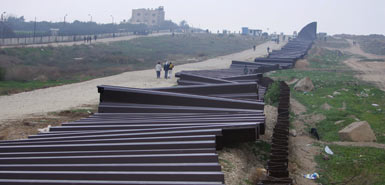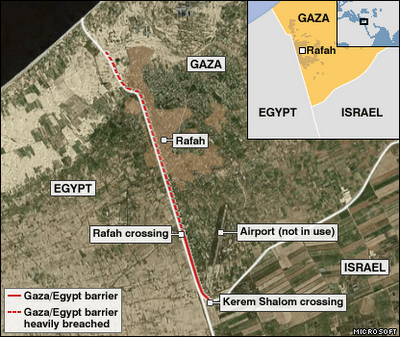From
Amir Taheri.
'I HAVE lost hope of liberating Iraq and turning it into an Is lamic society." So said Muqtada al-Sadr in an open letter to his followers published last week. The young Shiite mullah once claimed he would lead Iraq "back to true Islam," but he has been in Iran for at least the last six months. He had been expected to announce an end to the cease-fire observed by his Mahdi Army since 2007. Instead, he voiced a litany of woes that ended with an implicit pledge not to reactivate his death squads. |
The exodus of Sadr from Iraqi politics came as a shock to many observers, including this one. But, as always the questions must be asked, why? The answer lies in his exodus speech.
| Muqtada blamed members of his entourage and unnamed mullahs and Shiite notables for having "undermined the struggle" for "worldly reasons" and for having succumbed to the temptation of wealth and power presented to them by the Iraqi government. [Emphasis Added] |
There exists two characteristics of a young democracy.
First, it brings a weak federal government. A weak central government is a result of a constitution which is overly cautious of tyranny. A weak central government is plaqued with a series of checks and balances buttressed by extreme partisanship which hinders its ability to serve the people. In addition, new democratic leadership is still focused on the old power (the wealthy) vice the new power (the people). We are seeing this phenomenon in Iraq currently.
Secondly, as a result of the weak central government's inability to serve the people, local power brokers arise. These power brokers arise as a result of the need of the people to be served. In Iraq, this niche is being filled by tribal leaders and political parties.
Sadr, early on, represented an old power and hence became a power broker at the local level. He lost the support of the people because of a third phenonoma of a young democracy, namely the violent, mafia-style ruling of local power brokers. Specifically, his organization side-stepped the new rule of law established in the democracy and begin to extort vice protect the people.
It was not the people in Iraq who "succumbed to the temptation of wealth and power". Instead, it was his organization itself that succumbed to this temptation.
Thus, Sadr withdrew from politics, at least in the near term.
Iraq is not only maturing as a young democracy, but also has external influences thrust upon it (Al Qaeda, Syria, and Iran) which have stymied its maturation. The bad side of this external influence is typically violence as the opposing powers seeks influence in the new state. The good side of this external influence is violence accelerates the learning process of a new democracy.
Whereas the US went through several stages of robber barons and mafia control in relative safety due to its geographic isolation, Iraq is going through these stages with antagonists on its immediate borders. The main power broker in the region, Iran, still seeks to make Iraq into a puppet state. However, Iran has recently realized something as a result of the surge.
In recent months, Tehran policymakers have begun to understand a crucial fact about Iraq: Any weakening of Prime Minister Nouri al-Maliki's government now could persuade the United States to throw its support behind an alternative, anti-Iranian coalition of Arab Sunnis, Kurds and secular Shiites openly hostile to Iran. [Emphasis Added] Thus, Tehran and Washington have a joint interest in keeping al-Maliki's coalition in power - at least until next year's Iraqi general election. |
As such, Iran, being the theocracy it is, is gravitating to what it knows, namely schooling Sadr to become a full fledge ayatollah to replace the aging Sistani, who many Iranians (and Shiite Lebanese for that matter) still look upon as the spiritual leader of Shiism.
Iranians are looking long term in Iraq, which is why they are risking taking Sadr out of the mix for 5 to 10 years. However, Iraqis are also looking long term and are realizing what all young democratic people realize, namely extremism (whether political or religious)brings factionalization resulting in war which hinders growth and economic prosperity.
Iraqis have shunned extremists. It first happened in Al Anbar when the Sunni tribes kicked Al Qaeda in Iraq out of the province. It happened with Sadr's Madhi Army which was forced into a ceasefire in August 2007 after the violence it perpetuated in Karbala. It more recently happened south of Baghdad in the triangle of death region. It is currently happening in the religiously mixed area of the Diyala and the city of Mosul.
So where does this leave Iraq, Iran, and the US. The US has a few major factors going for it. First, it is impartial and is not taking sides among extremists. Secondly, it brought forth and continues to bring freedom and democracy to the region. Thirdly, it is assisting the people. These three factors are why the US is the major power in the region.
Iraq, attempting to model the instruments of power the US wields is establishing a strong, mostly secular Army that is going after all extremists, whether Sunni or Shia. The government is attempting to bring economic prosperity to its people. It is allowing free press which tells of its achievements and its failings. Finally, it is diplomatically pursuing external relationships among its fellow nations, including Iran.
Iran, unfortunately for them, gravitates only to what it knows, namely theocratic rule and suppression. Democracy has been brought to Iraq. Iraqis have fought for and are still fighting for the freedom that democracy brings. Iran, with it sectarian ways, continues to alienate fellow Iraqis who only want freedom and democracy.
If Sadr had real power, his position as an ayatollah would not matter. Iran believes it does matter and is taking Sadr out of the mix to increase his theocratic power. However, by the time he returns, Iraq (the most secular nation in the middle east prior to 2003) will grow more secular and be more distrustful of theocratic powers.
The only thing the US needs to continue to do is maintain its nonpartisanship presence in the region. It needs to support the duly elected powers in Iraq and continue to push for a transparent, democratic government. Upon new elected powers, it needs to support the new government as long as they maintain the rule of law and continue to pursue a tranparent democracy.
Iraqis want freedom and democracy. The US has given it to them. Iraqis have fought for and won their freedom and are continuing to build a democracy which every day is learning better to serve the people that brought it into power. Upcoming provincial and national elections are important, as Mr. Taheri points out, because it will continue to bring in new local power brokers to the federal government. If wanting to stay in power, these now national level, local power brokers will have to legislate for the people.
Iran is operating under the wrong paradigm. As such, it will fail to achieve its objective as long as the US maintains a fair, nonpartisan presence in the country. Al Qaeda never learned this lesson and was expelled from Al Anbar because of it. It is currently being expelled wholesale from Iraq. As Iraqs continue to experiment with democracy and the democracy grows to serve the people, Iran, and other neighbors, will continue to by stymied in all attempts to pursuade the Iraqi government to adopt its principles.
What no nation in the region understands is the transformation taking place in Iraq. It is transforming from a feudal, tribal society to a federalist democracy. Iraqiness is becoming more important than anyting because of the blood that has been spilled to maintain a unified Iraq.
Labels: Al Qaeda in Iraq, Iran, Iraq




